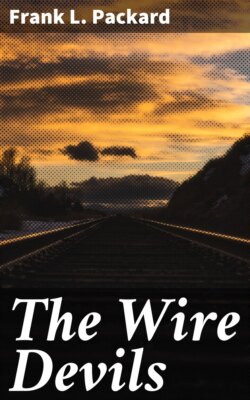Читать книгу The Wire Devils - Frank L. Packard - Страница 4
На сайте Литреса книга снята с продажи.
I—THE SECRET CODE
ОглавлениеTable of Contents
TWO switch lights twinkled; one at the east, and one at the west end of the siding. For the rest all was blackness. Half way between the switch lights, snuggled close against the single-tracked main line, the station, little more than a shanty and too insignificant to boast a night operator, loomed up shadowy and indistinct. Away to the westward, like jagged points sticking up into the night and standing out in relief against the skyline, the Rockies reared their peaks. And the spell of the brooding mountains seemed to lie over all the desolate, butte-broken surrounding country—for all was utter silence.
And then there came a sound, low at first, like a strange muttering from somewhere to the westward.
It died away, grew louder, was hushed again—and broke into a sustained roar. Came then the quick, short gasps of the exhaust—it was a freight, and a heavy one. And suddenly, from up the track, circling an intervening butte, an electric headlight cut streaming through the black. It touched the little station in a queerly inquisitive way in the sweep of its arc, lingered an instant over the platform, then swung to the right of way, and held there, the metals glistening like polished silver ribbons under the flood of light.
Straining, panting at its load, reddening the sky as the fire-box door was flung open, the big tenwheeler stormed by, coughing the sparks heavenward from its stack. The roar in the still night grew deafening, as boxcar, flat and gondola, lurching, swaying, clanking, groaning, an endless string, tugging at one another, grinding their flanges, screaming as they took up the axle play, staggered with a din infernal past the lonely and unlighted station.
The roar sank into a gradually diminishing murmur. The tail-lights winked like mischievous little red eyes in the distance—and vanished.
All was stillness and that brooding silence again.
And then a man's form, like a black shadow in the darkness, rose from the trackside, and crept to the platform, and along the platform to the station door.
The man bent forward, and the round, white ray of a pocket flashlight played upon the lock. He examined the lock for an instant appraisingly, then drew a bunch of skeleton keys from his pocket, and, selecting one of the number without hesitation, unlocked the door, stepped inside, and closed the door behind him.
The flashlight swept in a circle around the interior of the little station. There were but two rooms—the small waiting room which he had entered, and in which he now stood; and, partitioned off from this, the door open, a still smaller inner room, the agent's office. He moved at once into the latter, and his flashlight, swiftly now, searched around the walls and held upon the clock. It was six minutes to ten.
“Pretty close work!” muttered the man. “Six minutes to wait.”
The ray travelled now over the operator's table, and from the table to the switchboard. He reached out, “cut in” the office circuit, listened for an instant as the sounder began to chatter—then the ray swept over the table again. Under a newspaper, that the day man had apparently flung down at haphazard on leaving the office, he found a pad of telegraph blanks, from which, evidently wary of the consequences of using a pad with its resultant tell-tale impressions on the under sheets, he tore off a sheet and laid it down ready to hand before him.
This done, he nodded complacently, sat down in the operator's chair, tilted the chair back, put his feet up on the table, and coolly picked up the newspaper. It was the evening edition of the Selkirk City Journal, that had presumably been tossed off at the station by a charitable train crew of some late afternoon train out from the city. He held the paper in one hand, the flashlight in the other, scanned the page, which happened to be an inner one, cursorily, turned it over, and suddenly leaned forward a little in his seat. He was staring at the headline at the top right-hand corner of the front page.
